Cox Committee
 From Conservapedia
From Conservapedia During the 82nd United States Congress, the House of Representatives voted to enact the Select Committee to Investigate Tax-Exempt Foundations and Comparable Organizations. Named after its chair Eugene E. Cox, the committee during the congressional session is known as the Cox Committee.
The U.S. House in April 1952 approved the resolution which enacted the select committee by a 194–158 vote.[1] The vote was not among party lines, although Republicans showed slightly stronger support for the measure than Democrats.
U.S. House Select Committee to Investigate Tax-Exempt Foundations and Comparable Organizations, 82nd Congress | ||||||
Contents
Composition[edit]
Cox, the chair of the committee, was a Democrat segregationist from Georgia. The other members of the Democratic Party among the committee were L. Brooks Hays of Arkansas, Aimé J. Forand of Rhode Island, and Donald L. O'Toole of New York.
The three Republican members were Richard M. Simpson of Pennsylvania, B. Carroll Reece of Tennessee, and Angier L. Goodwin of Massachusetts.
The committee's general counsel was Harold M. Keele.[2] Other key members were staff director Thomas J. Feeney, attorney Edward C. Kennelly, Director of Research Joseph C. Kiger, and clerk Mary E. Searight.
Although there was a 4–3 Democrat majority, Cox was a part of the Conservative Coalition, thus allowing for a simultaneous 4–3 conservative majority on the committee;[3] the other three Democrats, Hays, Forand, and O'Toole, were mostly liberal-leaning New Dealers.
Confusion between Wayne Hays and Brooks Hays[edit]
A number of sources covering the Cox Committee make it unclear as to whether "Hays" referred to Brooks Hays or Wayne Hays. Although some cite the latter as a member who was acting chairman and filled the place of Cox,[4] the final report states that Brooks Hays was the acting chairman.[2] The two are unrelated.
Investigation and report[edit]
The Cox Committee's investigation focused on the following twelve points:[5]
| “ |
|
” |
| —Final Report Of The Select Committee To Investigate Foundations And Other Organizations | ||
The committee in 1952 sent all major foundations questionnaires which requested information about their operations and activities.[3] Although it conducted hearings which amount to hundreds of pages in transcripts, the Cox Committee's investigation was not in-depth. Congressman Reece missed most of the sessions due to family illnesses.[4]
Extensive and incriminating testimonies were heard by the committee from ex-communists such as Manning Johnson, Louis Budenz, and Maurice Malkin, who shared information of foundations who funded efforts plotted in Moscow, Russia to subvert American society.[6]
Cox died in December 1952 prior to the conclusion of the committee's work and report's release.[3] The 15 page-long[6][note 1] final report contained little substance and did not declare major foundations to have been subversive. It asserted on the second and third points:[7]
Our investigation, hurried by lack of time, indicates that very few actual Communists or Communist sympathizers obtained positions of influence in the foundations. However, there are some unhappy instances where the committee is convinced infiltration occurred. There remains the ugly unalterable fact that Alger Hiss became the president of the Carnegie Endowment for International Peace. And this despite the fact that his nomination and election came about through the efforts of men of proven loyalty and broad experience in public affairs....
The committee believes that on balance the record of the foundations is good. It believes that there was infiltration and that judgments were made which, in the light of hindsight, were mistakes, but it also believes that many of these mistakes were made without the knowledge of facts which, while later obtainable, could not have been readily ascertained at the time decisions were taken. It further believes that the foundations are aware of the ever-present danger and are exerting and will continue to exert diligence in averting further mistakes. While unwilling to say the foundations are blameless, the committee believes they were guilty principally of indulging the same gullibility which infected far too many of our loyal and patriotic citizens and that the mistakes they made are unlikely to be repeated. The committee does not want to imply that errors of judgment constitute malfeasance.
Rep. Reece, expressing disapproval of the shallowness, commented:[4][8]
| “ | As pointed out and stressed in this report, the select committee has had in sufficient time for the magnitude of its task. Although I was unable to attend the full hearing I feel compelled to observe that, if a more comprehensive study is desired, the inquiry might be continued by the Eighty-third Congress with profit in view of the importance of the subject, the fact that tax-exempt funds in very large amounts are spent without public accountability or official supervision of any sort, and that, admittedly, considerable question able expenditures have been made. | ” |
| —B. Carroll Reece | ||
Aftermath[edit]
Among the six remaining members of the select committee following Cox's death and the release of the final report, Rep. Reece was unsatisfied with the scope of the investigation and was the only one to seek a do-over.[3] The new Republican-majority House in 1953 voted to re-enact the committee,[9] and Reece was put in charge. Simpson, Hays, Goodwin, and Forand voted against the resolution.[note 2]
A suggestion the Cox Committee report brought up was a potential investigation of foundations who used their privileges for the purpose of tax evasion:[4][10]
The committee regards questions 11 and 12 as matters for the consideration of the Committee on Ways and Means. It therefore has made no attempt to find the answers to these questions. We feel the questions are of sufficient importance to warrant inquiry....
We respectfully suggest that the [Committee on Ways and Means] reexamine pertinent tax laws, to the end that they may be so drawn as to encourage the free-enterprise system with its rewards from which private individuals may make gifts to these meritorious institutions.
This would be investigated later in 1962 by the Select Committee on Small Business under liberal Texas representative Wright Patman (known as the Patman Committee). Reece did not focus on this aspect, instead prioritizing a scrutiny of subversion. He stated during an extensive House speech:[4]
| “ | Some of these activities and some of these institutions support efforts to overthrow our Government and to undermine our American way of life.
These activities urgently require investigation. Here lies the story of how communism and socialism are financed in the United States, where they get their money. It is the story of who pays the bill. There is evidence to show that there is a diabolical conspiracy back of all this. Its aim is the furtherance of socialism in the United States. The method by which this is done seems fantastic to reasonable men, for these Communists and Socialists seize control of fortunes left behind by Capitalists when they die, and turn these fortunes around to finance the destruction of Capitalism. |
” |
| —B. Carroll Reece | ||
The subsequent Reece Committee proved to conduct a more extensive investigation that that of the Cox Committee. In the final Dodd report, the following criticisms of the Cox Committee were mentioned:[3]
| “ |
|
” |
| —The Dodd Report to the Reece Committee on Foundations | ||
References[edit]
- ↑ H RES 561. RESOLUTION CREATING A SELECT COMMITTEE TO CON- DUCT AN INVESTIGATION AND STUDY OF FOUNDATIONS AND OTHER COMPARABLE ORGANIZATIONS.. GovTrack.us. Retrieved September 21, 2021.
- ↑ 2.0 2.1 January 1, 1953. Final Report Of The Select Committee To Investigate Foundations And Other Organizations (Pursuant to H. Res. 561, 82d Cong.), p. II. Retrieved October 4, 2021.
- ↑ 3.0 3.1 3.2 3.3 3.4 FascinatingPolitics (December 22, 2019). The Reece Committee on Foundations: Conspiratorial Nonsense or an Expose of a Threat to the Nation?. Mad Politics: The Bizarre, Fascinating, and Unknown of American Political History. Retrieved September 21, 2021.
- ↑ 4.0 4.1 4.2 4.3 4.4 Samson, Steven Alan. Charity For All: B. Carroll Reece and the Tax-Exempt Foundations. Liberty University. Retrieved September 22, 2021.
- ↑ Final Report, pp. 5–6. Retrieved October 4, 2021.
- ↑ 6.0 6.1 Jasper, William F. (February 6, 2017). Foundations: Cutting Off the Toxic Funding Flow. The New American. Retrieved September 21, 2021.
- ↑ Final Report, pp. 7–8. Retrieved October 4, 2021.
- ↑ Final Report, p. 14. Retrieved October 4, 2021.
- ↑ H RES 217. RESOLUTION CREATING A SPECIAL COMMITTEE TO CON- DUCT A FULL AND COMPLETE INVESTIGATION AND STUDY OF EDUCA- TIONAL AND PHILANTHROPIC FOUNDATIONS AND OTHER COMPARABLE ORGANIZATIONS WHICH ARE EXEMPT FROM FED. INCOME TAXATION.. GovTrack.us. Retrieved September 21, 2021.
- ↑ Final Report, p. 13. Retrieved October 4, 2021.
Notes[edit]
External links[edit]
- Cox Committee hearings (the compilation is very long!)
Categories: [United States House of Representatives] [1950s] [Anti-Communism]
↧ Download as ZWI file | Last modified: 03/08/2023 15:06:46 | 48 views
☰ Source: https://www.conservapedia.com/Cox_Committee | License: CC BY-SA 3.0
 ZWI signed:
ZWI signed:

.jpg)


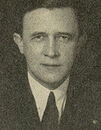
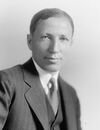

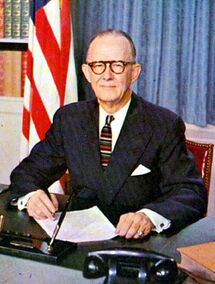
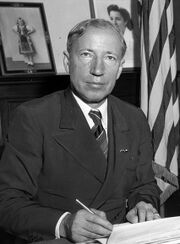
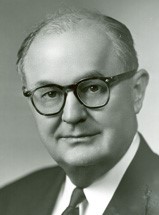
 KSF
KSF